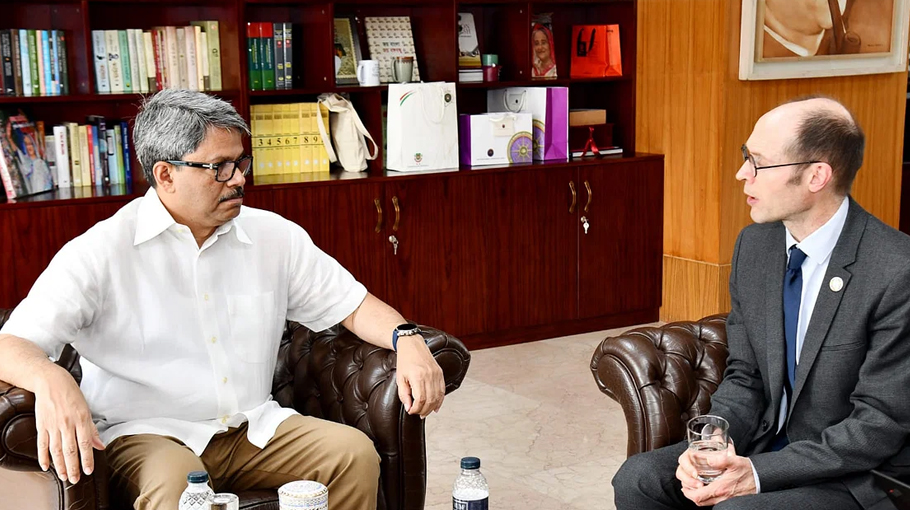UN expert sees food cut for Rohingyas as HR violation

A UN poverty expert on Monday said that the international community had a duty to help as the fund crisis had resulted in the cut of food ratios for the Rohingya population in Cox’s Bazar.
As a result of this cut, UN Special Rapporteur on extreme poverty and human rights, Olivier De Schutter, said “under-nutrition and malnutrition will increase, translating into higher stunting rates for children. Immunity to diseases will decline. This is a violation of human rights.”
“As long as the conditions for repatriation to their country of origin are not met, the Rohingya have a right to decent living conditions where they are. The international community has a duty to help,” he said at a press briefing ending his 12-day Bangladesh visit.
The mission included a visit to Cox's Bazar, where De Schutter visited the camps that have housed 977,798 Rohingya refugees most of whom fled the genocidal attack in neighbouring Myanmar in 2017.
While paying tribute to the Government of Bangladesh for hosting nearly a million refugees in an already overcrowded country, he deplored the living conditions in the camps.
“Until the conditions for repatriation are met, the Rohingya must be allowed to live a decent and dignified life,” the expert said. “The Government of Bangladesh and the international community all have a role to play.”
The Special Rapporteur said it was “unconscionable” that international donors had contributed so little to the 2023 Joint Response Plan which calls for $876 million USD to address the urgent humanitarian needs in the camps, only 17% of which is funded. Since March 2023, the World Food Programme has had to cut the value of its food vouchers from $12 USD to $10 USD per person per month, and the value will be further reduced to $8 USD in June.
De Schutter warned that malnutrition and undernutrition would increase, with dramatic consequences, especially for children. “Families are growing desperate. If the Government of Bangladesh were to recognise the right of the Rohingya to seek employment and earn an income, as required under human rights law, that would alleviate at least some of the pain,” the expert said.
He spoke on a number of issues including Bangladesh’s graduation from the LDC and said the government of Bangladesh must move away from its reliance on cheap labour if it is to ensure a rights-based development following its expected graduation from LDC status.
“A country’s comparative advantage cannot lie in keeping its people poor,” he said.
“Bangladesh’s development has largely been driven by one export sector – the ready-made garment industry – which is highly dependent on keeping wages low,” he said.
De Schutter urged the Government to use its upcoming graduation from LDC status in 2026 as an opportunity to rethink its reliance on the ready-made garment industry, which currently accounts for 82% of the country’s export revenue and employs 4 million workers.
“As Bangladesh moves towards graduation, it continues to focus much of its energy on providing tax incentives to international investors and establishing special economic zones,” he said.
He also expressed his “deep concern” that civic space has been severely restricted in recent years. “In particular, the Digital Security Act (2018) has been used to suppress independent thought and voices including on the internet. Human rights defenders, students, activists, journalists, opposition politicians and academics have been harassed, detained and, in some cases, allegedly torture during custody – resulting in death.”
During his visit, the expert travelled throughout the country and met with people living in poverty.
He noted that while Bangladesh has made remarkable progress in reducing overall income poverty, multidimensional poverty remains high and income inequality has increased, particularly in urban areas.
“Overall economic progress has been uneven, with groups such as the Adivasi, Dalit, Bede, Hijra and religious and linguistic minorities such as the Bihari left out,” the Special Rapporteur said.
“The Government has also carried out evictions in informal settlements under the guise of development, without following due process or providing adequate compensation and rehabilitation – in violation of the right to adequate housing,” he said.
De Schutter urged the Government to rationalise its social protection system, which he described as “a patchwork of 119 schemes that emerge on an ad hoc basis, are poorly coordinated and do not provide the level of income security that Bangladeshis should expect”.
He expressed concern that the tax-to-GDP ratio was particularly low (at around 7.8 per cent) and that almost two-thirds of public revenue to finance social protection came from indirect taxation, while only one-third came from direct taxation on income.
The Special Rapporteur will present his final report on Bangladesh to the Human Rights Council in June 2024.



